Sasol's Global Business Environment: Challenges and Strategies
VerifiedAdded on 2023/06/07
|14
|4458
|344
Report
AI Summary
This report provides an in-depth analysis of Sasol's operations within the global business environment, examining key factors such as cost, market dynamics, environmental considerations, and competition that affect global trade and commerce. It includes a PESTLE analysis of Sasol, highlighting the political, economic, social, technological, legal, and environmental influences impacting the company. The report discusses the complexities of strategic challenges faced by organizations operating globally, including language barriers, cultural differences, and managing global teams. Furthermore, it explores the influence of globalization on organizational governance, leadership, structure, culture, and functions, referencing Hofstede's cultural dimensions and McKinsey's 7s framework. The study also investigates the influence of globalization on Sasol's functions, decision-making processes in a global context, methods for entering international markets, and the barriers encountered in foreign marketplaces. The conclusion summarizes the key findings and their implications for Sasol's global operations.
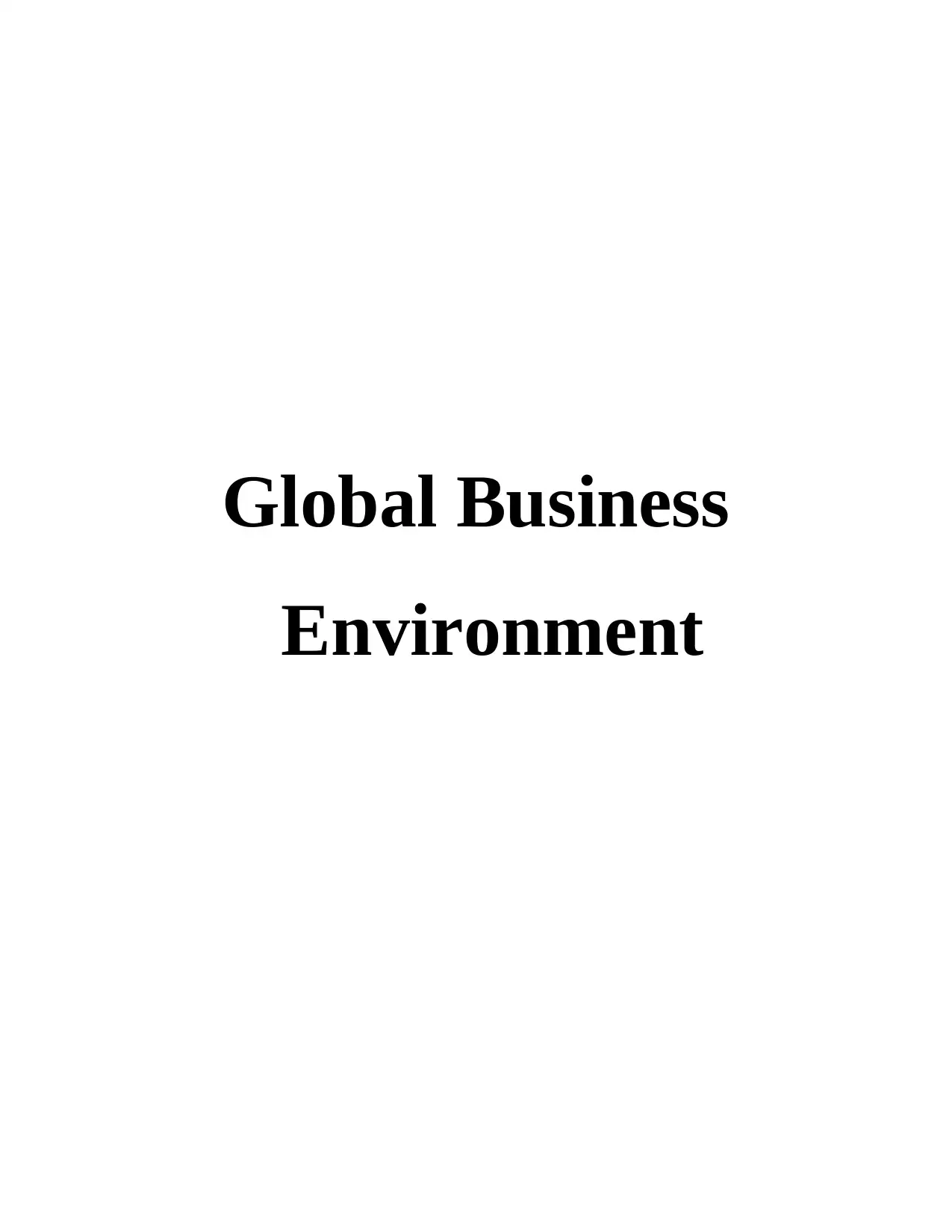
Global Business
Environment
Environment
Paraphrase This Document
Need a fresh take? Get an instant paraphrase of this document with our AI Paraphraser
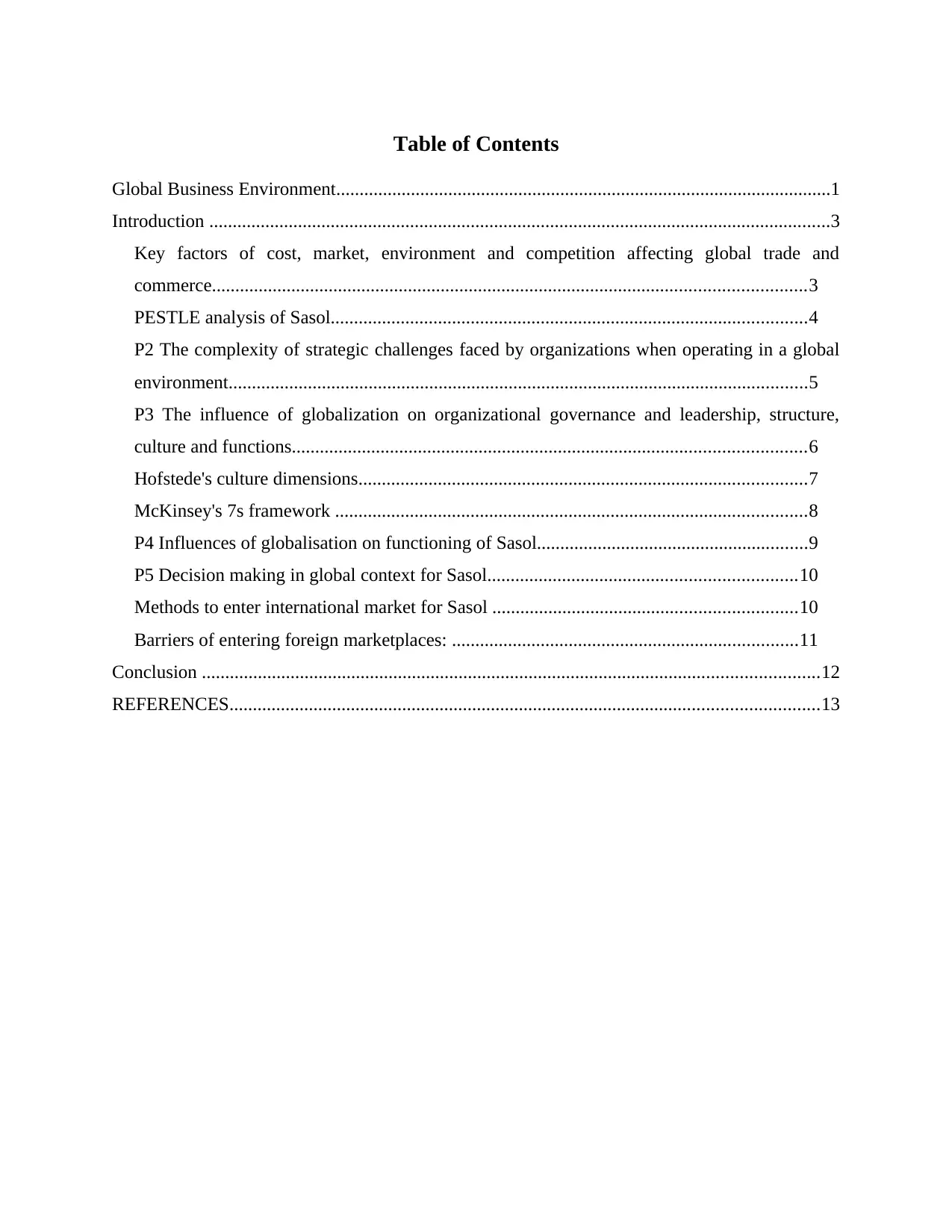
Table of Contents
Global Business Environment..........................................................................................................1
Introduction .....................................................................................................................................3
Key factors of cost, market, environment and competition affecting global trade and
commerce...............................................................................................................................3
PESTLE analysis of Sasol......................................................................................................4
P2 The complexity of strategic challenges faced by organizations when operating in a global
environment............................................................................................................................5
P3 The influence of globalization on organizational governance and leadership, structure,
culture and functions..............................................................................................................6
Hofstede's culture dimensions................................................................................................7
McKinsey's 7s framework .....................................................................................................8
P4 Influences of globalisation on functioning of Sasol..........................................................9
P5 Decision making in global context for Sasol..................................................................10
Methods to enter international market for Sasol .................................................................10
Barriers of entering foreign marketplaces: ..........................................................................11
Conclusion ....................................................................................................................................12
REFERENCES..............................................................................................................................13
Global Business Environment..........................................................................................................1
Introduction .....................................................................................................................................3
Key factors of cost, market, environment and competition affecting global trade and
commerce...............................................................................................................................3
PESTLE analysis of Sasol......................................................................................................4
P2 The complexity of strategic challenges faced by organizations when operating in a global
environment............................................................................................................................5
P3 The influence of globalization on organizational governance and leadership, structure,
culture and functions..............................................................................................................6
Hofstede's culture dimensions................................................................................................7
McKinsey's 7s framework .....................................................................................................8
P4 Influences of globalisation on functioning of Sasol..........................................................9
P5 Decision making in global context for Sasol..................................................................10
Methods to enter international market for Sasol .................................................................10
Barriers of entering foreign marketplaces: ..........................................................................11
Conclusion ....................................................................................................................................12
REFERENCES..............................................................................................................................13
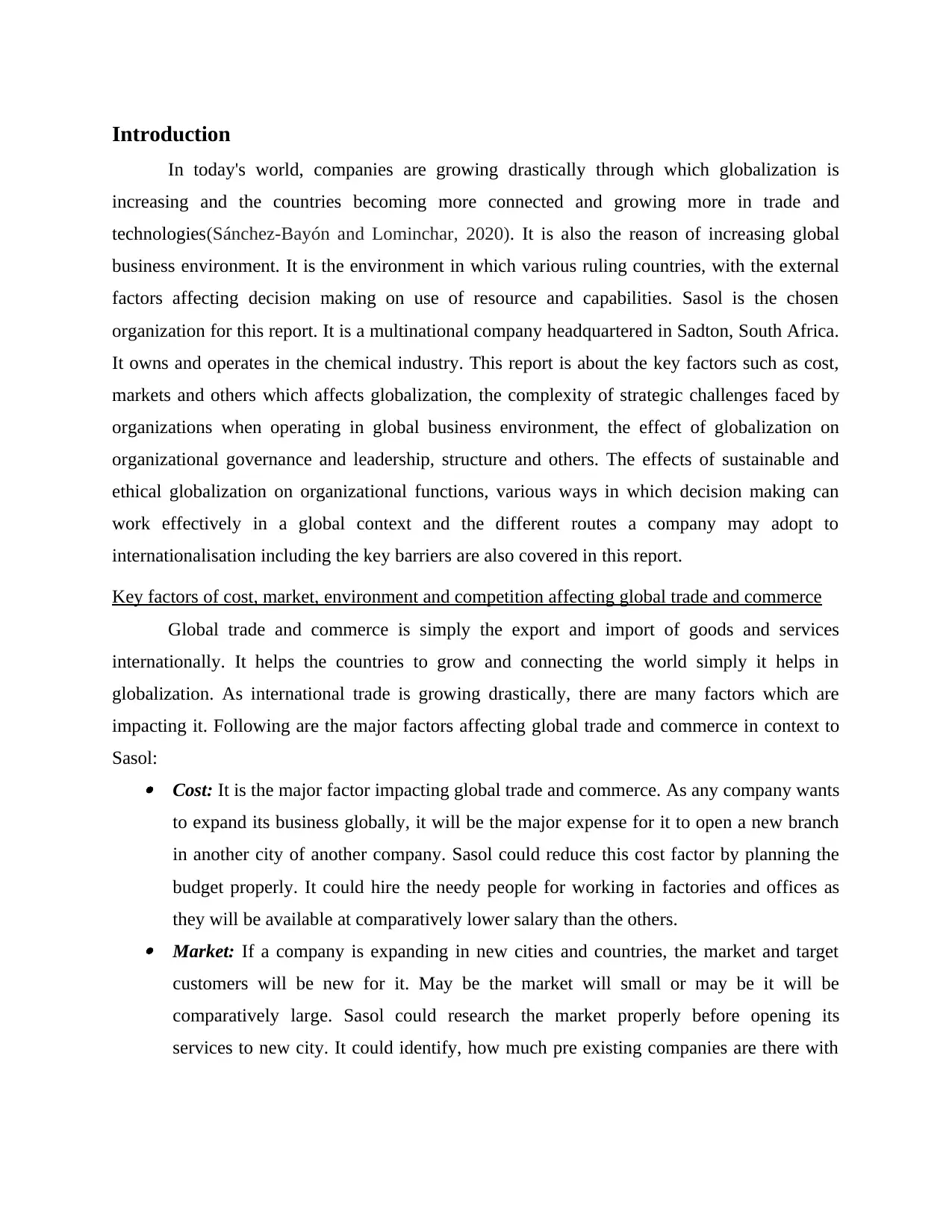
Introduction
In today's world, companies are growing drastically through which globalization is
increasing and the countries becoming more connected and growing more in trade and
technologies(Sánchez-Bayón and Lominchar, 2020). It is also the reason of increasing global
business environment. It is the environment in which various ruling countries, with the external
factors affecting decision making on use of resource and capabilities. Sasol is the chosen
organization for this report. It is a multinational company headquartered in Sadton, South Africa.
It owns and operates in the chemical industry. This report is about the key factors such as cost,
markets and others which affects globalization, the complexity of strategic challenges faced by
organizations when operating in global business environment, the effect of globalization on
organizational governance and leadership, structure and others. The effects of sustainable and
ethical globalization on organizational functions, various ways in which decision making can
work effectively in a global context and the different routes a company may adopt to
internationalisation including the key barriers are also covered in this report.
Key factors of cost, market, environment and competition affecting global trade and commerce
Global trade and commerce is simply the export and import of goods and services
internationally. It helps the countries to grow and connecting the world simply it helps in
globalization. As international trade is growing drastically, there are many factors which are
impacting it. Following are the major factors affecting global trade and commerce in context to
Sasol: Cost: It is the major factor impacting global trade and commerce. As any company wants
to expand its business globally, it will be the major expense for it to open a new branch
in another city of another company. Sasol could reduce this cost factor by planning the
budget properly. It could hire the needy people for working in factories and offices as
they will be available at comparatively lower salary than the others. Market: If a company is expanding in new cities and countries, the market and target
customers will be new for it. May be the market will small or may be it will be
comparatively large. Sasol could research the market properly before opening its
services to new city. It could identify, how much pre existing companies are there with
In today's world, companies are growing drastically through which globalization is
increasing and the countries becoming more connected and growing more in trade and
technologies(Sánchez-Bayón and Lominchar, 2020). It is also the reason of increasing global
business environment. It is the environment in which various ruling countries, with the external
factors affecting decision making on use of resource and capabilities. Sasol is the chosen
organization for this report. It is a multinational company headquartered in Sadton, South Africa.
It owns and operates in the chemical industry. This report is about the key factors such as cost,
markets and others which affects globalization, the complexity of strategic challenges faced by
organizations when operating in global business environment, the effect of globalization on
organizational governance and leadership, structure and others. The effects of sustainable and
ethical globalization on organizational functions, various ways in which decision making can
work effectively in a global context and the different routes a company may adopt to
internationalisation including the key barriers are also covered in this report.
Key factors of cost, market, environment and competition affecting global trade and commerce
Global trade and commerce is simply the export and import of goods and services
internationally. It helps the countries to grow and connecting the world simply it helps in
globalization. As international trade is growing drastically, there are many factors which are
impacting it. Following are the major factors affecting global trade and commerce in context to
Sasol: Cost: It is the major factor impacting global trade and commerce. As any company wants
to expand its business globally, it will be the major expense for it to open a new branch
in another city of another company. Sasol could reduce this cost factor by planning the
budget properly. It could hire the needy people for working in factories and offices as
they will be available at comparatively lower salary than the others. Market: If a company is expanding in new cities and countries, the market and target
customers will be new for it. May be the market will small or may be it will be
comparatively large. Sasol could research the market properly before opening its
services to new city. It could identify, how much pre existing companies are there with
⊘ This is a preview!⊘
Do you want full access?
Subscribe today to unlock all pages.

Trusted by 1+ million students worldwide
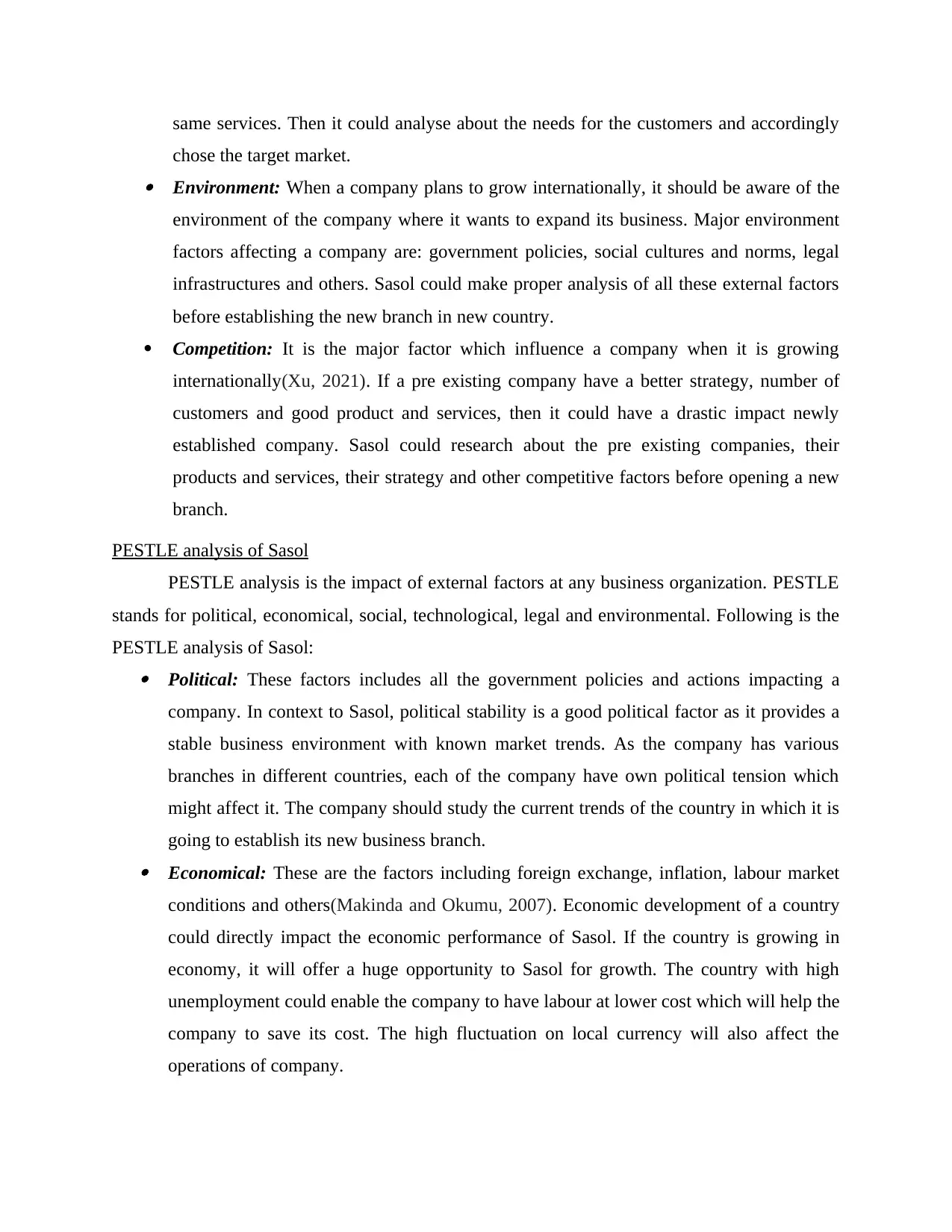
same services. Then it could analyse about the needs for the customers and accordingly
chose the target market. Environment: When a company plans to grow internationally, it should be aware of the
environment of the company where it wants to expand its business. Major environment
factors affecting a company are: government policies, social cultures and norms, legal
infrastructures and others. Sasol could make proper analysis of all these external factors
before establishing the new branch in new country.
Competition: It is the major factor which influence a company when it is growing
internationally(Xu, 2021). If a pre existing company have a better strategy, number of
customers and good product and services, then it could have a drastic impact newly
established company. Sasol could research about the pre existing companies, their
products and services, their strategy and other competitive factors before opening a new
branch.
PESTLE analysis of Sasol
PESTLE analysis is the impact of external factors at any business organization. PESTLE
stands for political, economical, social, technological, legal and environmental. Following is the
PESTLE analysis of Sasol: Political: These factors includes all the government policies and actions impacting a
company. In context to Sasol, political stability is a good political factor as it provides a
stable business environment with known market trends. As the company has various
branches in different countries, each of the company have own political tension which
might affect it. The company should study the current trends of the country in which it is
going to establish its new business branch. Economical: These are the factors including foreign exchange, inflation, labour market
conditions and others(Makinda and Okumu, 2007). Economic development of a country
could directly impact the economic performance of Sasol. If the country is growing in
economy, it will offer a huge opportunity to Sasol for growth. The country with high
unemployment could enable the company to have labour at lower cost which will help the
company to save its cost. The high fluctuation on local currency will also affect the
operations of company.
chose the target market. Environment: When a company plans to grow internationally, it should be aware of the
environment of the company where it wants to expand its business. Major environment
factors affecting a company are: government policies, social cultures and norms, legal
infrastructures and others. Sasol could make proper analysis of all these external factors
before establishing the new branch in new country.
Competition: It is the major factor which influence a company when it is growing
internationally(Xu, 2021). If a pre existing company have a better strategy, number of
customers and good product and services, then it could have a drastic impact newly
established company. Sasol could research about the pre existing companies, their
products and services, their strategy and other competitive factors before opening a new
branch.
PESTLE analysis of Sasol
PESTLE analysis is the impact of external factors at any business organization. PESTLE
stands for political, economical, social, technological, legal and environmental. Following is the
PESTLE analysis of Sasol: Political: These factors includes all the government policies and actions impacting a
company. In context to Sasol, political stability is a good political factor as it provides a
stable business environment with known market trends. As the company has various
branches in different countries, each of the company have own political tension which
might affect it. The company should study the current trends of the country in which it is
going to establish its new business branch. Economical: These are the factors including foreign exchange, inflation, labour market
conditions and others(Makinda and Okumu, 2007). Economic development of a country
could directly impact the economic performance of Sasol. If the country is growing in
economy, it will offer a huge opportunity to Sasol for growth. The country with high
unemployment could enable the company to have labour at lower cost which will help the
company to save its cost. The high fluctuation on local currency will also affect the
operations of company.
Paraphrase This Document
Need a fresh take? Get an instant paraphrase of this document with our AI Paraphraser
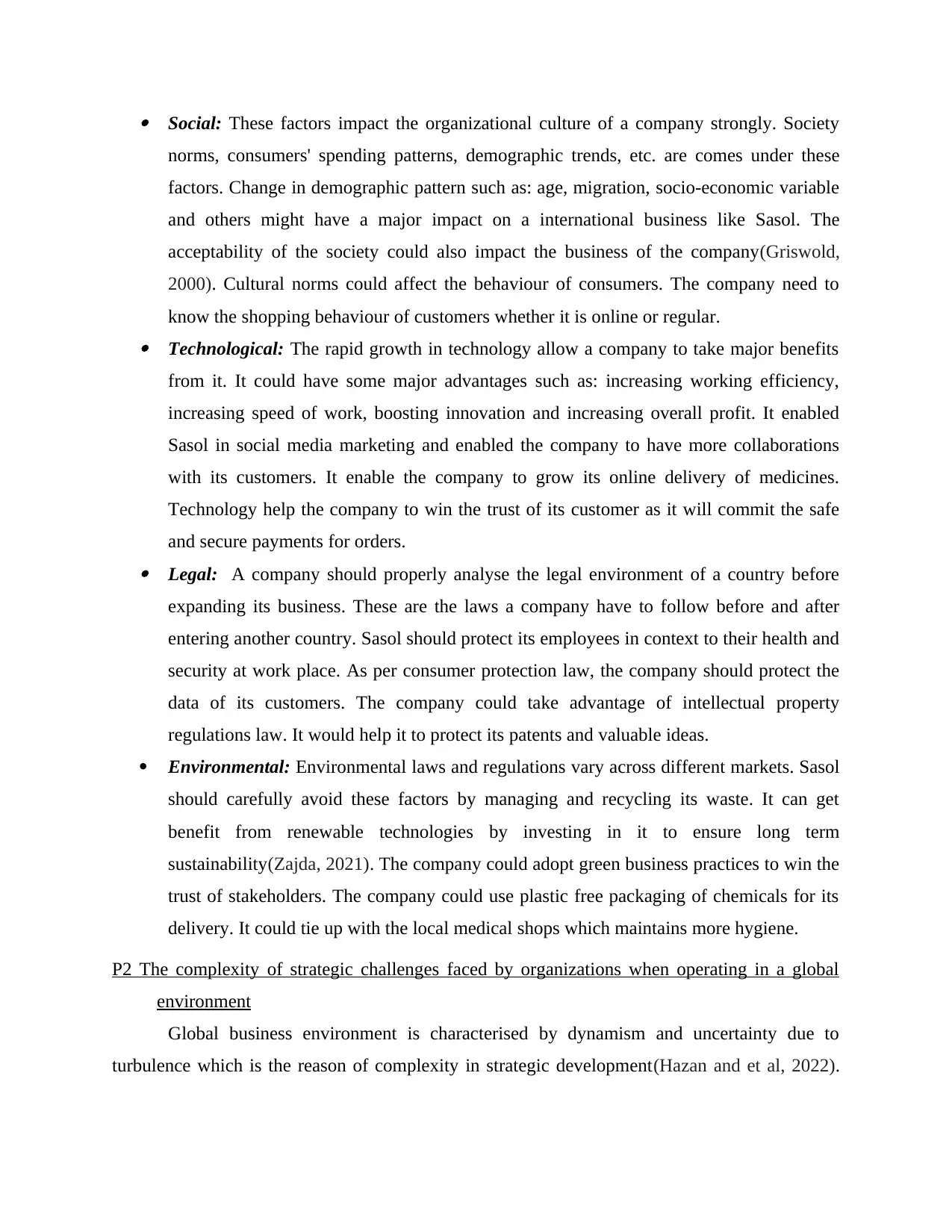
Social: These factors impact the organizational culture of a company strongly. Society
norms, consumers' spending patterns, demographic trends, etc. are comes under these
factors. Change in demographic pattern such as: age, migration, socio-economic variable
and others might have a major impact on a international business like Sasol. The
acceptability of the society could also impact the business of the company(Griswold,
2000). Cultural norms could affect the behaviour of consumers. The company need to
know the shopping behaviour of customers whether it is online or regular. Technological: The rapid growth in technology allow a company to take major benefits
from it. It could have some major advantages such as: increasing working efficiency,
increasing speed of work, boosting innovation and increasing overall profit. It enabled
Sasol in social media marketing and enabled the company to have more collaborations
with its customers. It enable the company to grow its online delivery of medicines.
Technology help the company to win the trust of its customer as it will commit the safe
and secure payments for orders. Legal: A company should properly analyse the legal environment of a country before
expanding its business. These are the laws a company have to follow before and after
entering another country. Sasol should protect its employees in context to their health and
security at work place. As per consumer protection law, the company should protect the
data of its customers. The company could take advantage of intellectual property
regulations law. It would help it to protect its patents and valuable ideas.
Environmental: Environmental laws and regulations vary across different markets. Sasol
should carefully avoid these factors by managing and recycling its waste. It can get
benefit from renewable technologies by investing in it to ensure long term
sustainability(Zajda, 2021). The company could adopt green business practices to win the
trust of stakeholders. The company could use plastic free packaging of chemicals for its
delivery. It could tie up with the local medical shops which maintains more hygiene.
P2 The complexity of strategic challenges faced by organizations when operating in a global
environment
Global business environment is characterised by dynamism and uncertainty due to
turbulence which is the reason of complexity in strategic development(Hazan and et al, 2022).
norms, consumers' spending patterns, demographic trends, etc. are comes under these
factors. Change in demographic pattern such as: age, migration, socio-economic variable
and others might have a major impact on a international business like Sasol. The
acceptability of the society could also impact the business of the company(Griswold,
2000). Cultural norms could affect the behaviour of consumers. The company need to
know the shopping behaviour of customers whether it is online or regular. Technological: The rapid growth in technology allow a company to take major benefits
from it. It could have some major advantages such as: increasing working efficiency,
increasing speed of work, boosting innovation and increasing overall profit. It enabled
Sasol in social media marketing and enabled the company to have more collaborations
with its customers. It enable the company to grow its online delivery of medicines.
Technology help the company to win the trust of its customer as it will commit the safe
and secure payments for orders. Legal: A company should properly analyse the legal environment of a country before
expanding its business. These are the laws a company have to follow before and after
entering another country. Sasol should protect its employees in context to their health and
security at work place. As per consumer protection law, the company should protect the
data of its customers. The company could take advantage of intellectual property
regulations law. It would help it to protect its patents and valuable ideas.
Environmental: Environmental laws and regulations vary across different markets. Sasol
should carefully avoid these factors by managing and recycling its waste. It can get
benefit from renewable technologies by investing in it to ensure long term
sustainability(Zajda, 2021). The company could adopt green business practices to win the
trust of stakeholders. The company could use plastic free packaging of chemicals for its
delivery. It could tie up with the local medical shops which maintains more hygiene.
P2 The complexity of strategic challenges faced by organizations when operating in a global
environment
Global business environment is characterised by dynamism and uncertainty due to
turbulence which is the reason of complexity in strategic development(Hazan and et al, 2022).
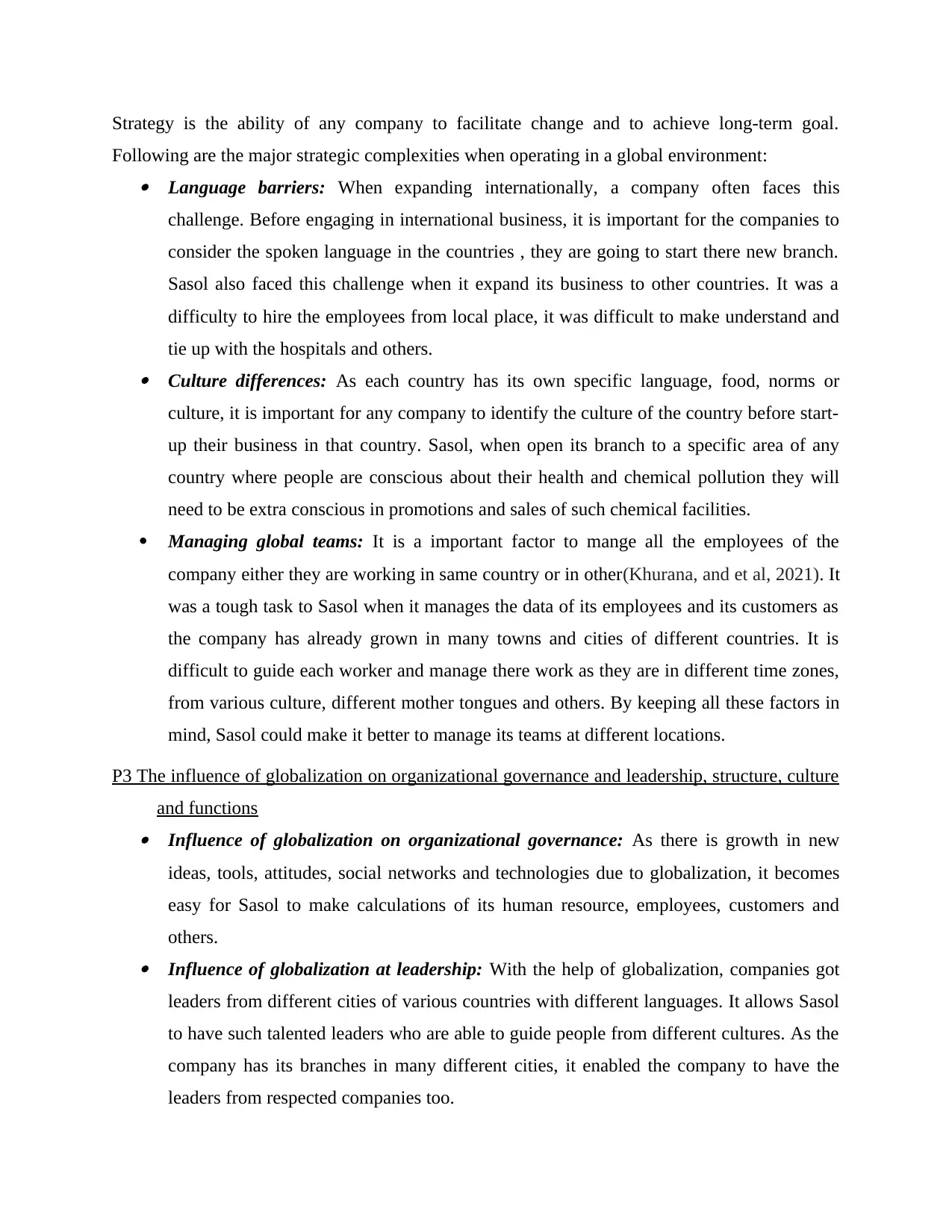
Strategy is the ability of any company to facilitate change and to achieve long-term goal.
Following are the major strategic complexities when operating in a global environment: Language barriers: When expanding internationally, a company often faces this
challenge. Before engaging in international business, it is important for the companies to
consider the spoken language in the countries , they are going to start there new branch.
Sasol also faced this challenge when it expand its business to other countries. It was a
difficulty to hire the employees from local place, it was difficult to make understand and
tie up with the hospitals and others. Culture differences: As each country has its own specific language, food, norms or
culture, it is important for any company to identify the culture of the country before start-
up their business in that country. Sasol, when open its branch to a specific area of any
country where people are conscious about their health and chemical pollution they will
need to be extra conscious in promotions and sales of such chemical facilities.
Managing global teams: It is a important factor to mange all the employees of the
company either they are working in same country or in other(Khurana, and et al, 2021). It
was a tough task to Sasol when it manages the data of its employees and its customers as
the company has already grown in many towns and cities of different countries. It is
difficult to guide each worker and manage there work as they are in different time zones,
from various culture, different mother tongues and others. By keeping all these factors in
mind, Sasol could make it better to manage its teams at different locations.
P3 The influence of globalization on organizational governance and leadership, structure, culture
and functions Influence of globalization on organizational governance: As there is growth in new
ideas, tools, attitudes, social networks and technologies due to globalization, it becomes
easy for Sasol to make calculations of its human resource, employees, customers and
others. Influence of globalization at leadership: With the help of globalization, companies got
leaders from different cities of various countries with different languages. It allows Sasol
to have such talented leaders who are able to guide people from different cultures. As the
company has its branches in many different cities, it enabled the company to have the
leaders from respected companies too.
Following are the major strategic complexities when operating in a global environment: Language barriers: When expanding internationally, a company often faces this
challenge. Before engaging in international business, it is important for the companies to
consider the spoken language in the countries , they are going to start there new branch.
Sasol also faced this challenge when it expand its business to other countries. It was a
difficulty to hire the employees from local place, it was difficult to make understand and
tie up with the hospitals and others. Culture differences: As each country has its own specific language, food, norms or
culture, it is important for any company to identify the culture of the country before start-
up their business in that country. Sasol, when open its branch to a specific area of any
country where people are conscious about their health and chemical pollution they will
need to be extra conscious in promotions and sales of such chemical facilities.
Managing global teams: It is a important factor to mange all the employees of the
company either they are working in same country or in other(Khurana, and et al, 2021). It
was a tough task to Sasol when it manages the data of its employees and its customers as
the company has already grown in many towns and cities of different countries. It is
difficult to guide each worker and manage there work as they are in different time zones,
from various culture, different mother tongues and others. By keeping all these factors in
mind, Sasol could make it better to manage its teams at different locations.
P3 The influence of globalization on organizational governance and leadership, structure, culture
and functions Influence of globalization on organizational governance: As there is growth in new
ideas, tools, attitudes, social networks and technologies due to globalization, it becomes
easy for Sasol to make calculations of its human resource, employees, customers and
others. Influence of globalization at leadership: With the help of globalization, companies got
leaders from different cities of various countries with different languages. It allows Sasol
to have such talented leaders who are able to guide people from different cultures. As the
company has its branches in many different cities, it enabled the company to have the
leaders from respected companies too.
⊘ This is a preview!⊘
Do you want full access?
Subscribe today to unlock all pages.

Trusted by 1+ million students worldwide
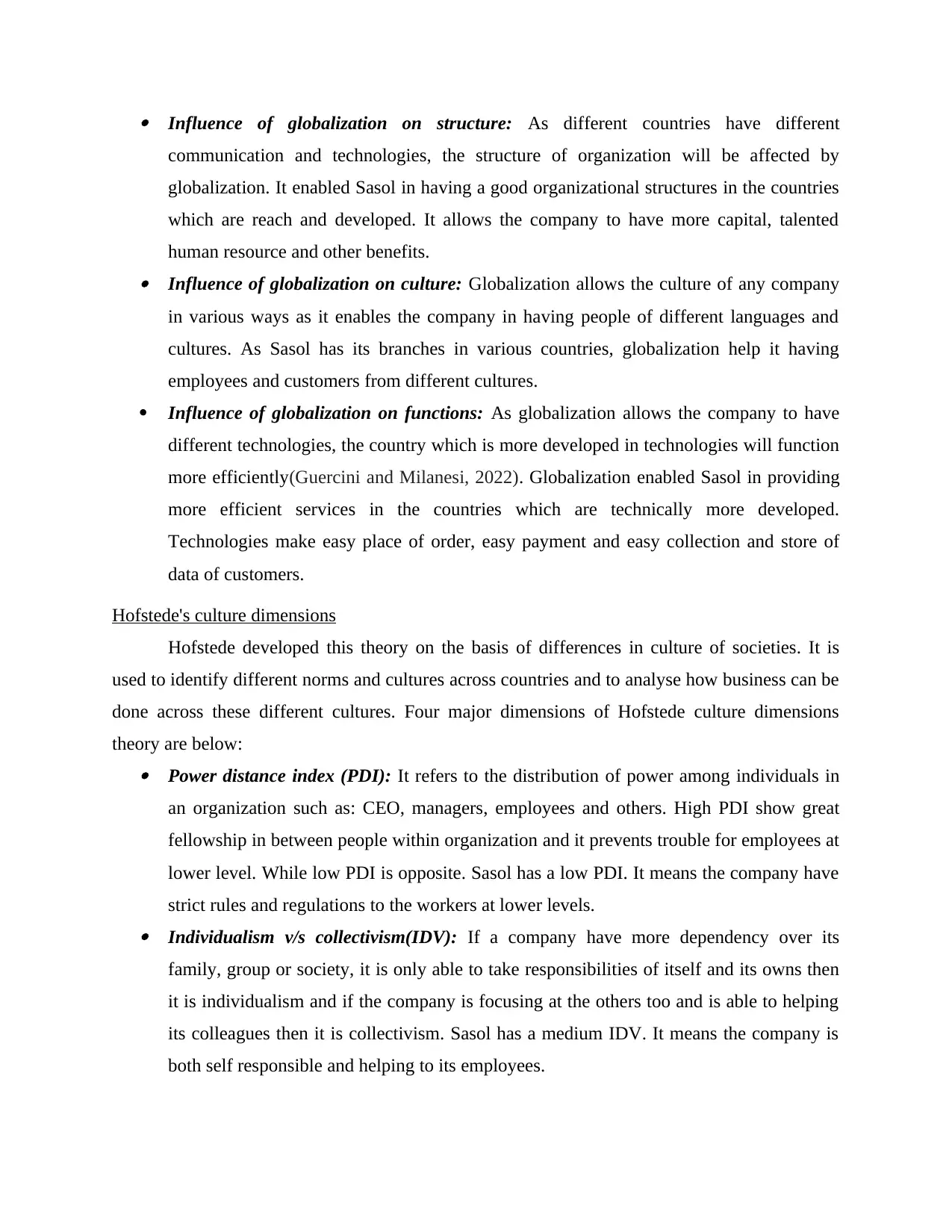
Influence of globalization on structure: As different countries have different
communication and technologies, the structure of organization will be affected by
globalization. It enabled Sasol in having a good organizational structures in the countries
which are reach and developed. It allows the company to have more capital, talented
human resource and other benefits. Influence of globalization on culture: Globalization allows the culture of any company
in various ways as it enables the company in having people of different languages and
cultures. As Sasol has its branches in various countries, globalization help it having
employees and customers from different cultures.
Influence of globalization on functions: As globalization allows the company to have
different technologies, the country which is more developed in technologies will function
more efficiently(Guercini and Milanesi, 2022). Globalization enabled Sasol in providing
more efficient services in the countries which are technically more developed.
Technologies make easy place of order, easy payment and easy collection and store of
data of customers.
Hofstede's culture dimensions
Hofstede developed this theory on the basis of differences in culture of societies. It is
used to identify different norms and cultures across countries and to analyse how business can be
done across these different cultures. Four major dimensions of Hofstede culture dimensions
theory are below: Power distance index (PDI): It refers to the distribution of power among individuals in
an organization such as: CEO, managers, employees and others. High PDI show great
fellowship in between people within organization and it prevents trouble for employees at
lower level. While low PDI is opposite. Sasol has a low PDI. It means the company have
strict rules and regulations to the workers at lower levels. Individualism v/s collectivism(IDV): If a company have more dependency over its
family, group or society, it is only able to take responsibilities of itself and its owns then
it is individualism and if the company is focusing at the others too and is able to helping
its colleagues then it is collectivism. Sasol has a medium IDV. It means the company is
both self responsible and helping to its employees.
communication and technologies, the structure of organization will be affected by
globalization. It enabled Sasol in having a good organizational structures in the countries
which are reach and developed. It allows the company to have more capital, talented
human resource and other benefits. Influence of globalization on culture: Globalization allows the culture of any company
in various ways as it enables the company in having people of different languages and
cultures. As Sasol has its branches in various countries, globalization help it having
employees and customers from different cultures.
Influence of globalization on functions: As globalization allows the company to have
different technologies, the country which is more developed in technologies will function
more efficiently(Guercini and Milanesi, 2022). Globalization enabled Sasol in providing
more efficient services in the countries which are technically more developed.
Technologies make easy place of order, easy payment and easy collection and store of
data of customers.
Hofstede's culture dimensions
Hofstede developed this theory on the basis of differences in culture of societies. It is
used to identify different norms and cultures across countries and to analyse how business can be
done across these different cultures. Four major dimensions of Hofstede culture dimensions
theory are below: Power distance index (PDI): It refers to the distribution of power among individuals in
an organization such as: CEO, managers, employees and others. High PDI show great
fellowship in between people within organization and it prevents trouble for employees at
lower level. While low PDI is opposite. Sasol has a low PDI. It means the company have
strict rules and regulations to the workers at lower levels. Individualism v/s collectivism(IDV): If a company have more dependency over its
family, group or society, it is only able to take responsibilities of itself and its owns then
it is individualism and if the company is focusing at the others too and is able to helping
its colleagues then it is collectivism. Sasol has a medium IDV. It means the company is
both self responsible and helping to its employees.
Paraphrase This Document
Need a fresh take? Get an instant paraphrase of this document with our AI Paraphraser
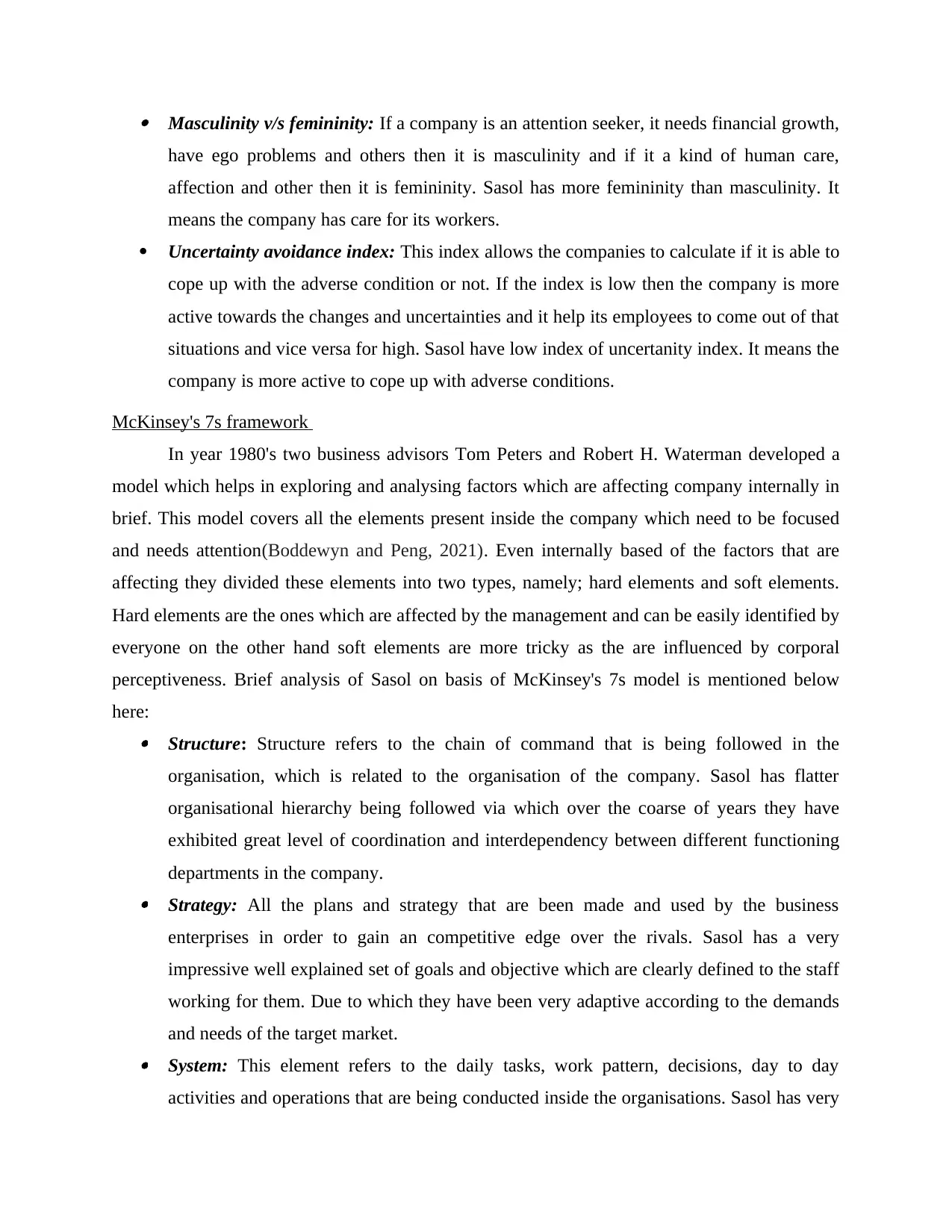
Masculinity v/s femininity: If a company is an attention seeker, it needs financial growth,
have ego problems and others then it is masculinity and if it a kind of human care,
affection and other then it is femininity. Sasol has more femininity than masculinity. It
means the company has care for its workers.
Uncertainty avoidance index: This index allows the companies to calculate if it is able to
cope up with the adverse condition or not. If the index is low then the company is more
active towards the changes and uncertainties and it help its employees to come out of that
situations and vice versa for high. Sasol have low index of uncertanity index. It means the
company is more active to cope up with adverse conditions.
McKinsey's 7s framework
In year 1980's two business advisors Tom Peters and Robert H. Waterman developed a
model which helps in exploring and analysing factors which are affecting company internally in
brief. This model covers all the elements present inside the company which need to be focused
and needs attention(Boddewyn and Peng, 2021). Even internally based of the factors that are
affecting they divided these elements into two types, namely; hard elements and soft elements.
Hard elements are the ones which are affected by the management and can be easily identified by
everyone on the other hand soft elements are more tricky as the are influenced by corporal
perceptiveness. Brief analysis of Sasol on basis of McKinsey's 7s model is mentioned below
here: Structure: Structure refers to the chain of command that is being followed in the
organisation, which is related to the organisation of the company. Sasol has flatter
organisational hierarchy being followed via which over the coarse of years they have
exhibited great level of coordination and interdependency between different functioning
departments in the company. Strategy: All the plans and strategy that are been made and used by the business
enterprises in order to gain an competitive edge over the rivals. Sasol has a very
impressive well explained set of goals and objective which are clearly defined to the staff
working for them. Due to which they have been very adaptive according to the demands
and needs of the target market. System: This element refers to the daily tasks, work pattern, decisions, day to day
activities and operations that are being conducted inside the organisations. Sasol has very
have ego problems and others then it is masculinity and if it a kind of human care,
affection and other then it is femininity. Sasol has more femininity than masculinity. It
means the company has care for its workers.
Uncertainty avoidance index: This index allows the companies to calculate if it is able to
cope up with the adverse condition or not. If the index is low then the company is more
active towards the changes and uncertainties and it help its employees to come out of that
situations and vice versa for high. Sasol have low index of uncertanity index. It means the
company is more active to cope up with adverse conditions.
McKinsey's 7s framework
In year 1980's two business advisors Tom Peters and Robert H. Waterman developed a
model which helps in exploring and analysing factors which are affecting company internally in
brief. This model covers all the elements present inside the company which need to be focused
and needs attention(Boddewyn and Peng, 2021). Even internally based of the factors that are
affecting they divided these elements into two types, namely; hard elements and soft elements.
Hard elements are the ones which are affected by the management and can be easily identified by
everyone on the other hand soft elements are more tricky as the are influenced by corporal
perceptiveness. Brief analysis of Sasol on basis of McKinsey's 7s model is mentioned below
here: Structure: Structure refers to the chain of command that is being followed in the
organisation, which is related to the organisation of the company. Sasol has flatter
organisational hierarchy being followed via which over the coarse of years they have
exhibited great level of coordination and interdependency between different functioning
departments in the company. Strategy: All the plans and strategy that are been made and used by the business
enterprises in order to gain an competitive edge over the rivals. Sasol has a very
impressive well explained set of goals and objective which are clearly defined to the staff
working for them. Due to which they have been very adaptive according to the demands
and needs of the target market. System: This element refers to the daily tasks, work pattern, decisions, day to day
activities and operations that are being conducted inside the organisations. Sasol has very
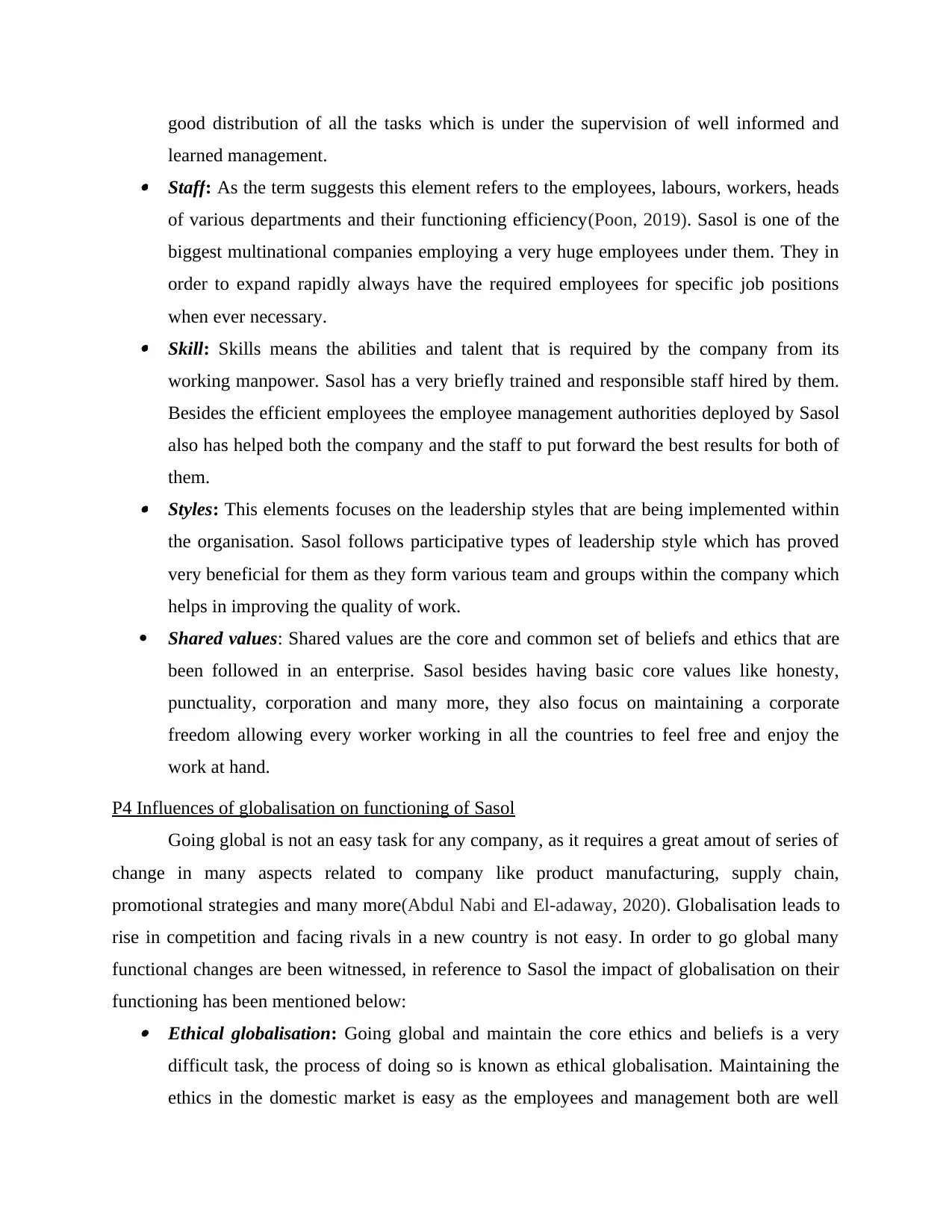
good distribution of all the tasks which is under the supervision of well informed and
learned management. Staff: As the term suggests this element refers to the employees, labours, workers, heads
of various departments and their functioning efficiency(Poon, 2019). Sasol is one of the
biggest multinational companies employing a very huge employees under them. They in
order to expand rapidly always have the required employees for specific job positions
when ever necessary. Skill: Skills means the abilities and talent that is required by the company from its
working manpower. Sasol has a very briefly trained and responsible staff hired by them.
Besides the efficient employees the employee management authorities deployed by Sasol
also has helped both the company and the staff to put forward the best results for both of
them. Styles: This elements focuses on the leadership styles that are being implemented within
the organisation. Sasol follows participative types of leadership style which has proved
very beneficial for them as they form various team and groups within the company which
helps in improving the quality of work.
Shared values: Shared values are the core and common set of beliefs and ethics that are
been followed in an enterprise. Sasol besides having basic core values like honesty,
punctuality, corporation and many more, they also focus on maintaining a corporate
freedom allowing every worker working in all the countries to feel free and enjoy the
work at hand.
P4 Influences of globalisation on functioning of Sasol
Going global is not an easy task for any company, as it requires a great amout of series of
change in many aspects related to company like product manufacturing, supply chain,
promotional strategies and many more(Abdul Nabi and El-adaway, 2020). Globalisation leads to
rise in competition and facing rivals in a new country is not easy. In order to go global many
functional changes are been witnessed, in reference to Sasol the impact of globalisation on their
functioning has been mentioned below: Ethical globalisation: Going global and maintain the core ethics and beliefs is a very
difficult task, the process of doing so is known as ethical globalisation. Maintaining the
ethics in the domestic market is easy as the employees and management both are well
learned management. Staff: As the term suggests this element refers to the employees, labours, workers, heads
of various departments and their functioning efficiency(Poon, 2019). Sasol is one of the
biggest multinational companies employing a very huge employees under them. They in
order to expand rapidly always have the required employees for specific job positions
when ever necessary. Skill: Skills means the abilities and talent that is required by the company from its
working manpower. Sasol has a very briefly trained and responsible staff hired by them.
Besides the efficient employees the employee management authorities deployed by Sasol
also has helped both the company and the staff to put forward the best results for both of
them. Styles: This elements focuses on the leadership styles that are being implemented within
the organisation. Sasol follows participative types of leadership style which has proved
very beneficial for them as they form various team and groups within the company which
helps in improving the quality of work.
Shared values: Shared values are the core and common set of beliefs and ethics that are
been followed in an enterprise. Sasol besides having basic core values like honesty,
punctuality, corporation and many more, they also focus on maintaining a corporate
freedom allowing every worker working in all the countries to feel free and enjoy the
work at hand.
P4 Influences of globalisation on functioning of Sasol
Going global is not an easy task for any company, as it requires a great amout of series of
change in many aspects related to company like product manufacturing, supply chain,
promotional strategies and many more(Abdul Nabi and El-adaway, 2020). Globalisation leads to
rise in competition and facing rivals in a new country is not easy. In order to go global many
functional changes are been witnessed, in reference to Sasol the impact of globalisation on their
functioning has been mentioned below: Ethical globalisation: Going global and maintain the core ethics and beliefs is a very
difficult task, the process of doing so is known as ethical globalisation. Maintaining the
ethics in the domestic market is easy as the employees and management both are well
⊘ This is a preview!⊘
Do you want full access?
Subscribe today to unlock all pages.

Trusted by 1+ million students worldwide
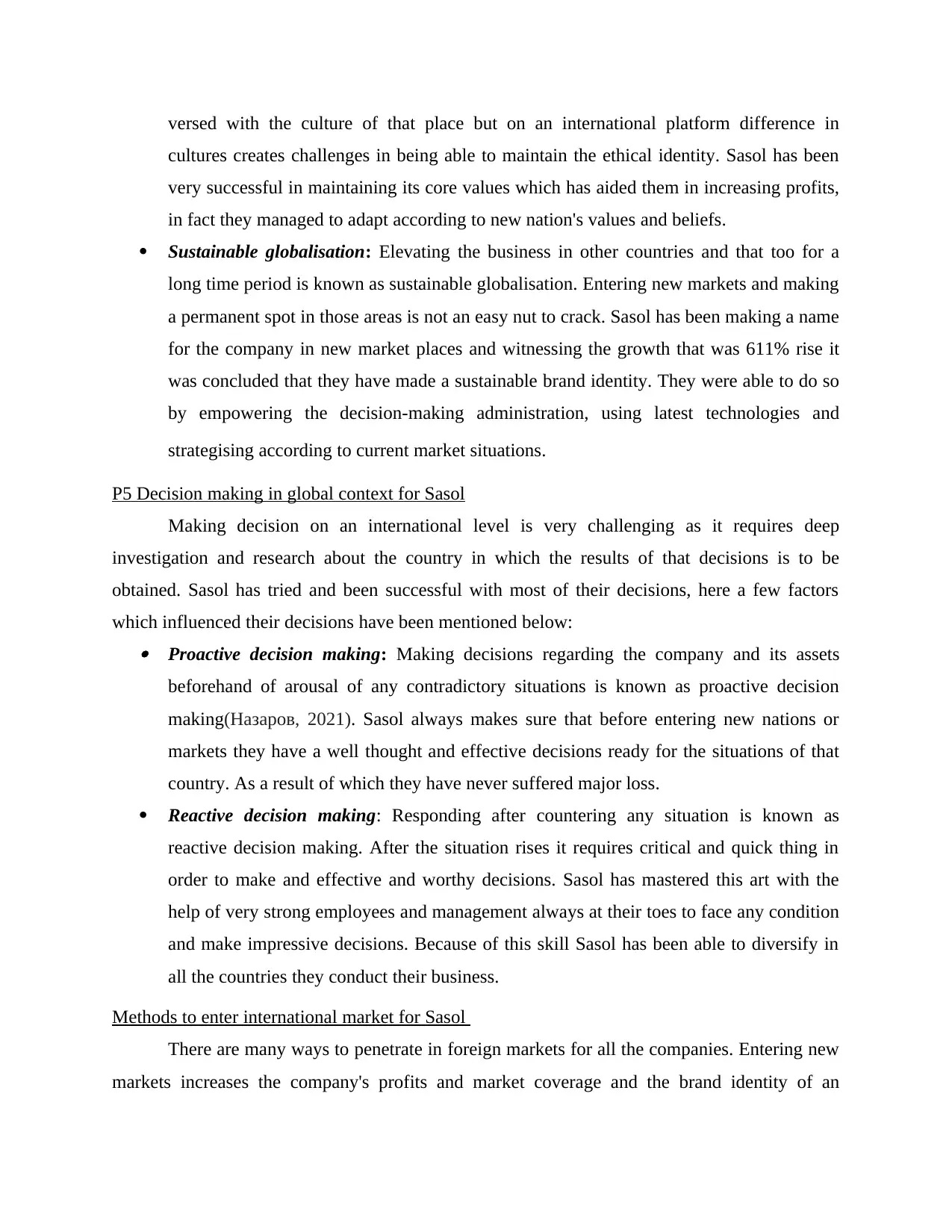
versed with the culture of that place but on an international platform difference in
cultures creates challenges in being able to maintain the ethical identity. Sasol has been
very successful in maintaining its core values which has aided them in increasing profits,
in fact they managed to adapt according to new nation's values and beliefs.
Sustainable globalisation: Elevating the business in other countries and that too for a
long time period is known as sustainable globalisation. Entering new markets and making
a permanent spot in those areas is not an easy nut to crack. Sasol has been making a name
for the company in new market places and witnessing the growth that was 611% rise it
was concluded that they have made a sustainable brand identity. They were able to do so
by empowering the decision-making administration, using latest technologies and
strategising according to current market situations.
P5 Decision making in global context for Sasol
Making decision on an international level is very challenging as it requires deep
investigation and research about the country in which the results of that decisions is to be
obtained. Sasol has tried and been successful with most of their decisions, here a few factors
which influenced their decisions have been mentioned below: Proactive decision making: Making decisions regarding the company and its assets
beforehand of arousal of any contradictory situations is known as proactive decision
making(Назаров, 2021). Sasol always makes sure that before entering new nations or
markets they have a well thought and effective decisions ready for the situations of that
country. As a result of which they have never suffered major loss.
Reactive decision making: Responding after countering any situation is known as
reactive decision making. After the situation rises it requires critical and quick thing in
order to make and effective and worthy decisions. Sasol has mastered this art with the
help of very strong employees and management always at their toes to face any condition
and make impressive decisions. Because of this skill Sasol has been able to diversify in
all the countries they conduct their business.
Methods to enter international market for Sasol
There are many ways to penetrate in foreign markets for all the companies. Entering new
markets increases the company's profits and market coverage and the brand identity of an
cultures creates challenges in being able to maintain the ethical identity. Sasol has been
very successful in maintaining its core values which has aided them in increasing profits,
in fact they managed to adapt according to new nation's values and beliefs.
Sustainable globalisation: Elevating the business in other countries and that too for a
long time period is known as sustainable globalisation. Entering new markets and making
a permanent spot in those areas is not an easy nut to crack. Sasol has been making a name
for the company in new market places and witnessing the growth that was 611% rise it
was concluded that they have made a sustainable brand identity. They were able to do so
by empowering the decision-making administration, using latest technologies and
strategising according to current market situations.
P5 Decision making in global context for Sasol
Making decision on an international level is very challenging as it requires deep
investigation and research about the country in which the results of that decisions is to be
obtained. Sasol has tried and been successful with most of their decisions, here a few factors
which influenced their decisions have been mentioned below: Proactive decision making: Making decisions regarding the company and its assets
beforehand of arousal of any contradictory situations is known as proactive decision
making(Назаров, 2021). Sasol always makes sure that before entering new nations or
markets they have a well thought and effective decisions ready for the situations of that
country. As a result of which they have never suffered major loss.
Reactive decision making: Responding after countering any situation is known as
reactive decision making. After the situation rises it requires critical and quick thing in
order to make and effective and worthy decisions. Sasol has mastered this art with the
help of very strong employees and management always at their toes to face any condition
and make impressive decisions. Because of this skill Sasol has been able to diversify in
all the countries they conduct their business.
Methods to enter international market for Sasol
There are many ways to penetrate in foreign markets for all the companies. Entering new
markets increases the company's profits and market coverage and the brand identity of an
Paraphrase This Document
Need a fresh take? Get an instant paraphrase of this document with our AI Paraphraser
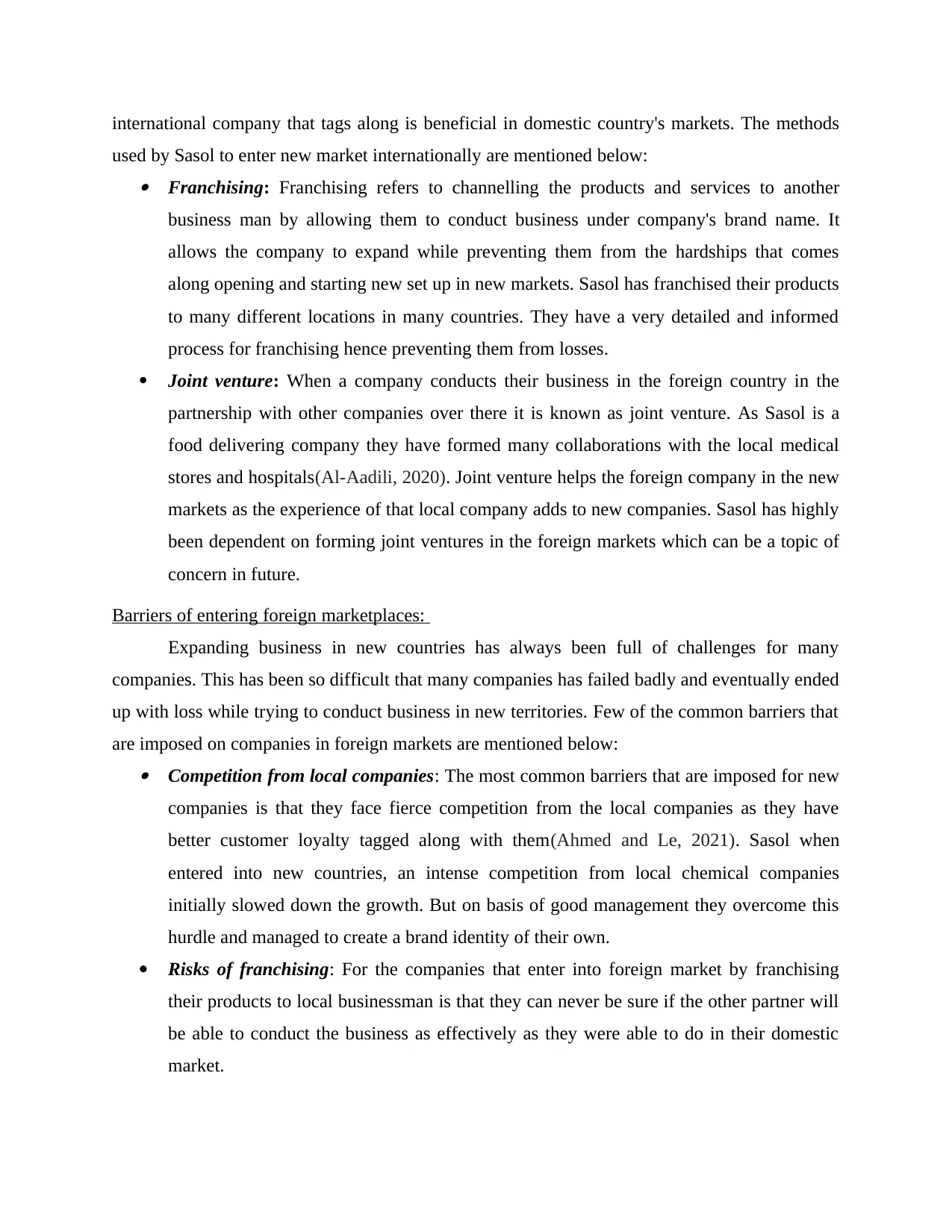
international company that tags along is beneficial in domestic country's markets. The methods
used by Sasol to enter new market internationally are mentioned below: Franchising: Franchising refers to channelling the products and services to another
business man by allowing them to conduct business under company's brand name. It
allows the company to expand while preventing them from the hardships that comes
along opening and starting new set up in new markets. Sasol has franchised their products
to many different locations in many countries. They have a very detailed and informed
process for franchising hence preventing them from losses.
Joint venture: When a company conducts their business in the foreign country in the
partnership with other companies over there it is known as joint venture. As Sasol is a
food delivering company they have formed many collaborations with the local medical
stores and hospitals(Al-Aadili, 2020). Joint venture helps the foreign company in the new
markets as the experience of that local company adds to new companies. Sasol has highly
been dependent on forming joint ventures in the foreign markets which can be a topic of
concern in future.
Barriers of entering foreign marketplaces:
Expanding business in new countries has always been full of challenges for many
companies. This has been so difficult that many companies has failed badly and eventually ended
up with loss while trying to conduct business in new territories. Few of the common barriers that
are imposed on companies in foreign markets are mentioned below: Competition from local companies: The most common barriers that are imposed for new
companies is that they face fierce competition from the local companies as they have
better customer loyalty tagged along with them(Ahmed and Le, 2021). Sasol when
entered into new countries, an intense competition from local chemical companies
initially slowed down the growth. But on basis of good management they overcome this
hurdle and managed to create a brand identity of their own.
Risks of franchising: For the companies that enter into foreign market by franchising
their products to local businessman is that they can never be sure if the other partner will
be able to conduct the business as effectively as they were able to do in their domestic
market.
used by Sasol to enter new market internationally are mentioned below: Franchising: Franchising refers to channelling the products and services to another
business man by allowing them to conduct business under company's brand name. It
allows the company to expand while preventing them from the hardships that comes
along opening and starting new set up in new markets. Sasol has franchised their products
to many different locations in many countries. They have a very detailed and informed
process for franchising hence preventing them from losses.
Joint venture: When a company conducts their business in the foreign country in the
partnership with other companies over there it is known as joint venture. As Sasol is a
food delivering company they have formed many collaborations with the local medical
stores and hospitals(Al-Aadili, 2020). Joint venture helps the foreign company in the new
markets as the experience of that local company adds to new companies. Sasol has highly
been dependent on forming joint ventures in the foreign markets which can be a topic of
concern in future.
Barriers of entering foreign marketplaces:
Expanding business in new countries has always been full of challenges for many
companies. This has been so difficult that many companies has failed badly and eventually ended
up with loss while trying to conduct business in new territories. Few of the common barriers that
are imposed on companies in foreign markets are mentioned below: Competition from local companies: The most common barriers that are imposed for new
companies is that they face fierce competition from the local companies as they have
better customer loyalty tagged along with them(Ahmed and Le, 2021). Sasol when
entered into new countries, an intense competition from local chemical companies
initially slowed down the growth. But on basis of good management they overcome this
hurdle and managed to create a brand identity of their own.
Risks of franchising: For the companies that enter into foreign market by franchising
their products to local businessman is that they can never be sure if the other partner will
be able to conduct the business as effectively as they were able to do in their domestic
market.
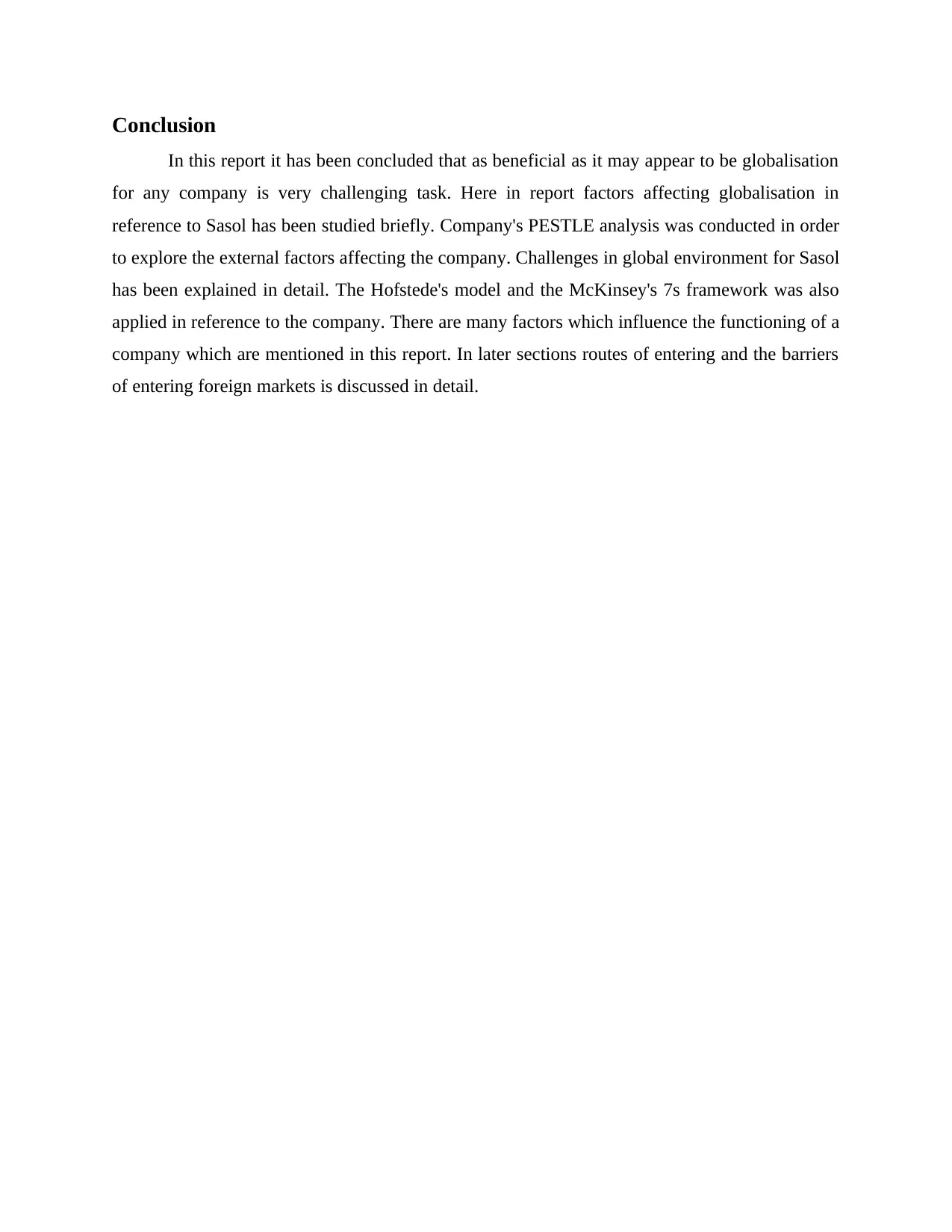
Conclusion
In this report it has been concluded that as beneficial as it may appear to be globalisation
for any company is very challenging task. Here in report factors affecting globalisation in
reference to Sasol has been studied briefly. Company's PESTLE analysis was conducted in order
to explore the external factors affecting the company. Challenges in global environment for Sasol
has been explained in detail. The Hofstede's model and the McKinsey's 7s framework was also
applied in reference to the company. There are many factors which influence the functioning of a
company which are mentioned in this report. In later sections routes of entering and the barriers
of entering foreign markets is discussed in detail.
In this report it has been concluded that as beneficial as it may appear to be globalisation
for any company is very challenging task. Here in report factors affecting globalisation in
reference to Sasol has been studied briefly. Company's PESTLE analysis was conducted in order
to explore the external factors affecting the company. Challenges in global environment for Sasol
has been explained in detail. The Hofstede's model and the McKinsey's 7s framework was also
applied in reference to the company. There are many factors which influence the functioning of a
company which are mentioned in this report. In later sections routes of entering and the barriers
of entering foreign markets is discussed in detail.
⊘ This is a preview!⊘
Do you want full access?
Subscribe today to unlock all pages.

Trusted by 1+ million students worldwide
1 out of 14
Related Documents
Your All-in-One AI-Powered Toolkit for Academic Success.
+13062052269
info@desklib.com
Available 24*7 on WhatsApp / Email
![[object Object]](/_next/static/media/star-bottom.7253800d.svg)
Unlock your academic potential
Copyright © 2020–2026 A2Z Services. All Rights Reserved. Developed and managed by ZUCOL.